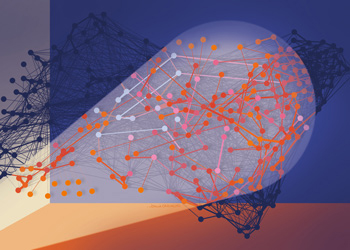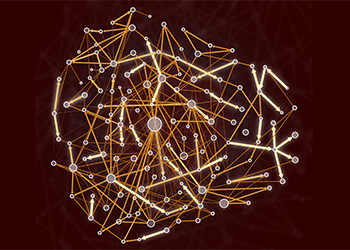
Complex Adaptive Systems and Computational Biology
Luís Rocha
Almost all interesting processes in nature and society are highly cross linked. In many systems, however, we can distinguish a set of fundamental building blocks, which interact nonlinearly to form compound structures or functions with an identity that requires more explanatory devices than those used to explain the building blocks.
Multivariate systems that need complementary, multi-level modes of description are defined as complex systems. They are typically modelled as networks or dynamical systems.
Examples abound:
The lab is particularly interested in the informational properties of natural and artificial systems which enable them to adapt and evolve. This means both understanding how information is fundamental for controlling the behavior and evolutionary capabilities of complex systems, as well as abstracting principles from natural systems to produce adaptive information technology.
This theoretical and applied research agenda is organized in three main threads:
- Complex networks & systems,
- Computational & Systems Biology, and
- Computational Intelligence.
Please also check the research group on Complex Adaptive Systems and Computational Intelligence (CASCI), for more details about our research and how to collaborate and study with us. The research group is also committed to interdisciplinary research, teaching and graduate training.
Projects
Networks are mathematical objects used to study multivariate systems.
Perhaps the most active interdisciplinary research arena is the intersection of the life sciences with informatics.
A key problem is how information, symbols and the like can arise from a purely dynamical system of many components.
Publications
- Rion Brattig Correia, Alain Barrat, Luis M. Rocha (2023) Contact networks have small metric backbones that maintain community structure and are primary transmission subgraphs. PLoS Comput Bio 19(2):e1010854
- Ian B. Wood, Rion Brattig Correia, Wendy R. Miller and Luis M. Rocha (2022) Small cohort of patients with epilepsy showed increased activity on Facebook before sudden unexpected death. Epilepsy & Behavior 128
- Tiago Simas, Rion Brattig Correia and Luis M. Rocha (2021) The distance backbone of complex networks. Journal of Complex Networks 9 (6)
- A.J. Gates, R.B. Correia, X. Wang, & L.M. Rocha (2021) The effective graph reveals redundancy, canalization, and control pathways in biochemical regulation and signalling. Proceedings of the National Academy of Sciences (PNAS) 118:12
- A. Gates and L.M. Rocha (2016) Control of complex networks requires both structure and dynamics. doi: 10.1038/srep24456. In Press. arXiv: 1509.08409. Scientific Reports 6:24456
- R.B. Correia, L. Li, L.M. Rocha (2016) Monitoring potential drug interactions and reactions via network analysis of Instagram user timeliness. Pacific Symposium on Biocomputing 21:492-503
- G.L. Ciampaglia, P. Shiralkar, L.M. Rocha, J. Bollen, F. Menczer, A. Flammini (2015) Computational fact checking from knowledge networks. doi:10.1371/journal.pone.0128193.. PLoS One 10(6):e0128193
- T. Simas and L.M. Rocha (2015) Distance Closures on Complex Networks. doi:10.1017/nws.2015.11. Network Science 3(2):227-268
- A. Kolchinsky, A. Lourenço, H. Wu, L. Li, and L.M. Rocha (2015) Extraction of Pharmacokinetic Evidence of Drug-drug Interactions from the literature. doi:10.1371/journal.pone.0122199.. PLoS ONE 10(5):e0122199
- A. Kolchinsky, A. Gates and L.M. Rocha (2015) Modularity and the spread of perturbations in complex dynamical systems. Phys. Rev. E Rapid Communications 92:060801(R)
- A. Kolchinsky, M. P. Van Den Heuvel, A. Griffa, P. Hagmann, L.M. Rocha, O. Sporns, J. Goni (2014) Multi-scale Integration and Predictability in Resting State Brain Activity. doi: 10.3389/fninf.2014.00066. Frontiers in Neuroinformatics 8:66
- Marques-Pita, M. and Rocha, L.M. (2013) Canalization and control in automata networks: body segmentation in Drosophila Melanogaster. PLoS ONE 8(3):e55946
- Rocha, L.M. and Hordijk, W. (2005) Material Representations: From the Genetic Code to the Evolution of Cellular Automata. Artificial Life 11(1-2):189 - 214
- Wall, M.E.,Rechtesteiner, A.and Rocha, L.M. (2003) Singular Value Decomposition and Principal Component Analysis . In: A Practical Approach to Microarray Data Analysis. D. P. Berrar, W. Dubitzky, and M. Granzow (Eds.). Kluwer Academic Publishers 91-109



